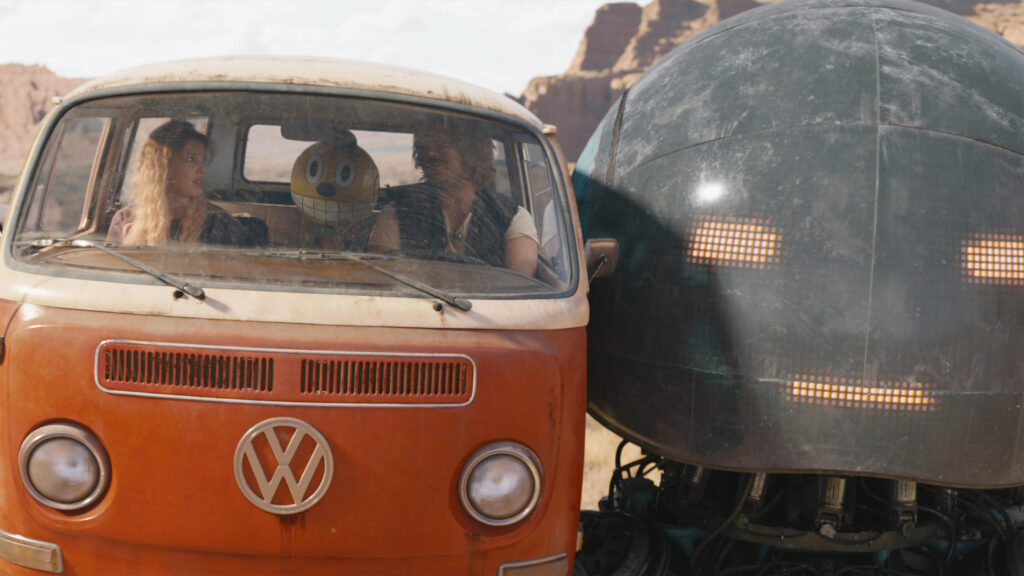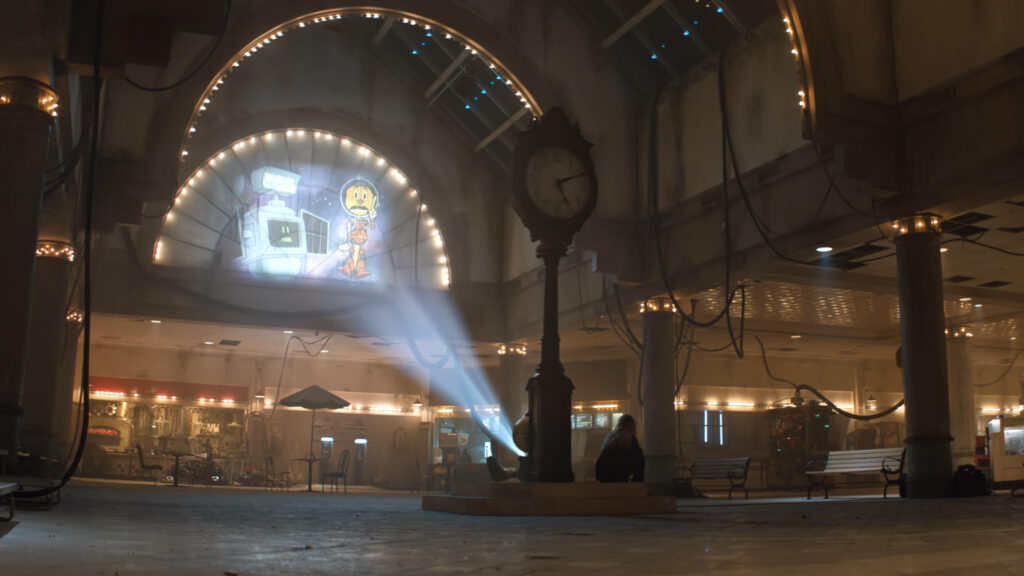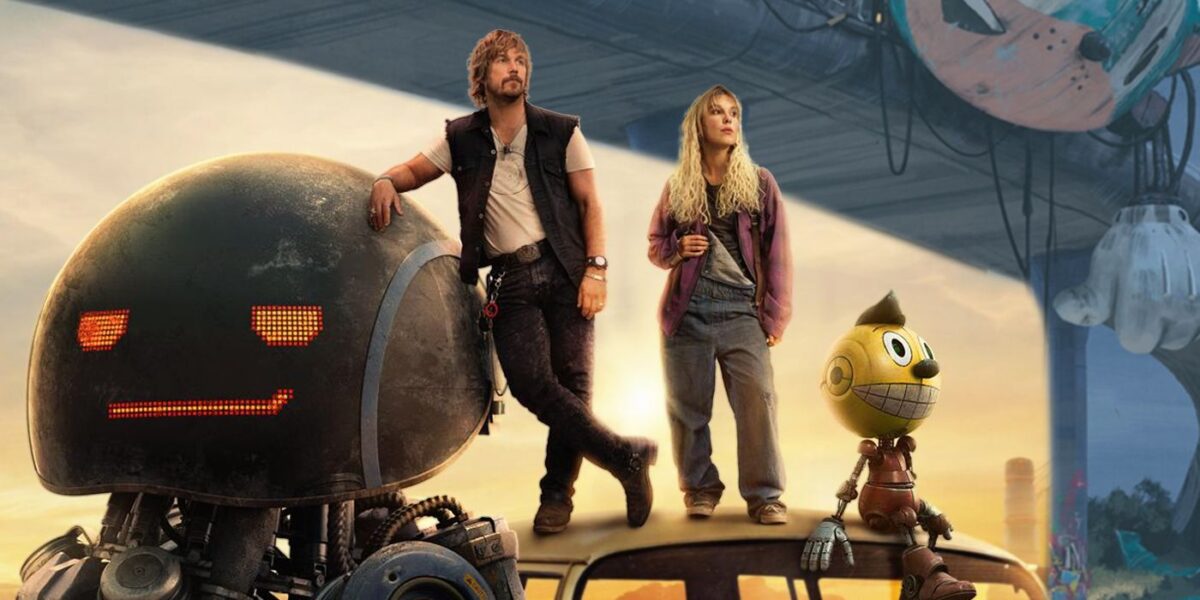You can't see it (it's electric)
As I watched the opening act of The Electric State, I felt something. Here, I use the phrase “feel something” in the sense of a gnat buzzing around my ear or a tick crawling up my leg rather than the evocation of an emotion in my heart, like sadness or cheer. Something in the film bugged me in a way I couldn’t quite shake off my skin. What started as an itch grew into a wound, like the film was dealing me Havana syndrome psychic damage.
What I felt was the festering artistic soul driving The Electric State. It is one thing for a filmmaker to create a strictly mercenary work absent of heart, a piece of entertainment churned out to line one’s own pockets and keep the slop rolling on the streamers’ content conveyor belt. I understand and empathize with filmmakers who treat their craft as a business. But under the hood of The Electric State is something else, something more sinister than a mere void of voice or vision. It is a narcissism and clueless rot in its creative identity. You see, this is a movie that stands with the villain but doesn’t realize it.
On its surface, there is nothing too provocative about The Electric State. It is aesthetically and structurally run-of-the-mill for 2020s PG-13 action-comedy fare. It is a post-apocalyptic robot battle movie, a rescue journey with a couple of heart-tugging family moments and plenty of star power in the cast. Despite debuting on Netflix it has the look of a big budget tentpole. I expected this, because its budget is indeed very big, reportedly surpassing $300 million. (Wikipedia cites it as the 13th most-expensive production in cinema history as of this writing.) The Electric State is created by the Russo brothers, directors of the highest-grossing non-James Cameron movie, Avengers: Endgame. Through its duration, it’s mostly robots who punch and shoot each other, but you’d only have to tweak the CGI models and textures a little bit and they’d be superheroes. The cinematography is not the worst gray-brown sludge you’ve ever seen, but it’s never bright or colorful. In summary, we’re fully in the Marvel style. Chris Pratt and Millie Bobby Brown headline the busy cast sheet. The Russos’ regular screenwriters, Christopher Markus and Stephen McFeely, adapted the script from an illustrated chapter book of the same name by Simon Stålenhag published in 2018. If I was feeling generous, I might go so far as to say that the film’s narrative is mostly functional, with a linear plot reasonably paced at 125 minutes.

So The Electric State is deeply ordinary and mediocre at first blush. But, like I said, the darkness creeps up on you. Consider Pratt’s deuteragonist, Keats: His charming, save-the-cat personality trait is… his love of merchandise and vintage geek memorabilia. The acquisition of stuff is the ends for Keats, not the means to some inner softness. He’s like if Han Solo’s dominant personality trait was collecting Funko Pops.
The dystopia in The Electric State is the fallout of a human-robot war, but we’re supposed to side with the robots rather than the humans. WALL-E presents a soul within its synthetic characters as irony against the absent and sedentary humans. Here, we have none of that investigation or wit. We simply root for the droids because gadgets are inherently cool, and people who hate them are bummers.
Two of the sympathetic side characters are anthropomorphized (or is it robomorphized?) corporate logos, including a friendly Planters Mr. Peanut bot voiced by Woody Harrelson as the leader of a robot resistance . Nothing screams revolution like a grocery mascot. Viva la corporación! None of the heroes seem to think that it’s odd that they champion conglomerate cartoons. Mr. Peanut and his entourage are the misunderstood good guys.
This might make you wonder where the villain Ethan Skate (Stanley Tucci) fits in. He is the CEO of a tech corp called Neurocaster. If Mr. Peanut is the good guy, who is the bad guy? Well, that’s where it gets strange. From the outside, he’s morally equivalent to the heroes. He makes and sells robots! He represents a world-famous brand, like Mr. Peanut. The obvious angle by the Russos would have been to make the villain an anti-technologist; but then it would lay bare that Skate’s motives are to protect humans, even if it means some inconvenience and having to live without a trusty android by your side. So instead, he’s a pro-tech hypocrite, but not in a way where his hypocrisy provides any sort of distinction.
The Russos have boxed themselves into a quagmire. The story they’ve created dictates a villain who must be pro-AI, pro-big tech, pro-devices, pro-media centralization, and pro-capitalism. But that’s what the Russos themselves are! They inadvertently created a mirror image of themselves with this supervillain. The story contorts itself, the plucky heroes no different from the villains except that they’re poor. (Ah, poverty, the most admirable character trait.) I like to imagine the Russos watching a cut of the film and one of them saying “are we the baddies?” to the other. In the end, the heroes defeat the villains by shutting down all the world’s Neurocaster-brand robotic devices. Rejoice, now the other brands of robotic devices can prosper.

I realize I’ve approached this film from the soapbox, and I apologize. I haven’t even described the movie all that much. (One thing I haven’t mentioned is that Ke Huy Quan has a major role, meaning Love Hurts has been topped for his worst film of 2025.) But even if The Electric State had made me feel all sunshine and rainbows, I don’t think I could rate it more than maybe a point higher than what I’m giving it below. Pratt is doing the laziest version yet of his goober everyman shtick. The plot opens with a bucket of exposition, then stalls out again in the midway point when Keats and Brown’s character Michelle learn the history of the robots. The plot centers around a conspiracy about a genius child, Michelle’s brother, controlling an entire evil army of robots while he’s in a coma, or some such idiocy. The action is watchable enough, but it never serves any purpose or drives the narrative. The set pieces are all non-sequitur mischief. If one side wins a fight and the other loses, it rarely matters. It’s just turmoil in between the adjacent plot points.
I don’t hate everything in the film. Brown, who I’ve never seen in a film or show before, has a little more charisma than I anticipated; unlike some of the talent around her, she’s taking this seriously. She could star in some YA franchise. (I understand Stranger Things to be approximately such a property.) And the CGI robots are tactile and well-rendered; I really believed they were in the same room as the human characters. I also should feel some relief that this is a standalone story unconnected with any broader cinematic universe or over-saturated IP (except Mr. Peanut, I guess). Plus, it’s all greased enough with professional craft to go down smoothly. This is not a broken film, per se.
But The Electric State is worse than broken: it’s evil. I felt righteously angry at the state of 2025 media as I watched, and I hate feeling righteously angry. Frankly, the reported budget nauseates me. Even with rampant inflation, $320 million can’t be a healthy amount to pour into a single streaming turd. My opening rant in my Scare Me review still stands: could Netflix not shaved off, I dunno, $50 million of that budget for producing and marketing some indie passion projects?
Is It Good?
Very Not Good (1/8)
Dan is the founder and head critic of The Goods. Follow Dan on Letterboxd. Join the Discord for updates and discussion.


5 replies on “The Electric State (2025)”
Netflix is a wasteland. Not at all sure why I still have a subscription.
I was gonna pick Monk back up, and they even lost that.
Yeah I probably would have canceled awhile ago except my daughters really like two or three shows on it. Those shows are our “panic button” when we really need the kids to calm down or be distracted. But I probably can find another way to make those shows accessible for something easier than, what, $15 a month these days?
There was a time not so very long ago when I was rooting for the Russo’s. (2014, specifically.) It’s a shame they ended up on the trajectory they did.
I want to like them because they are part of the talent pool that got their break on the show Community. My darling weird sitcom. (Oscar winner Ludwig Goransson, too.)
Preach. The paintball episodes are my faourites that show ever did.